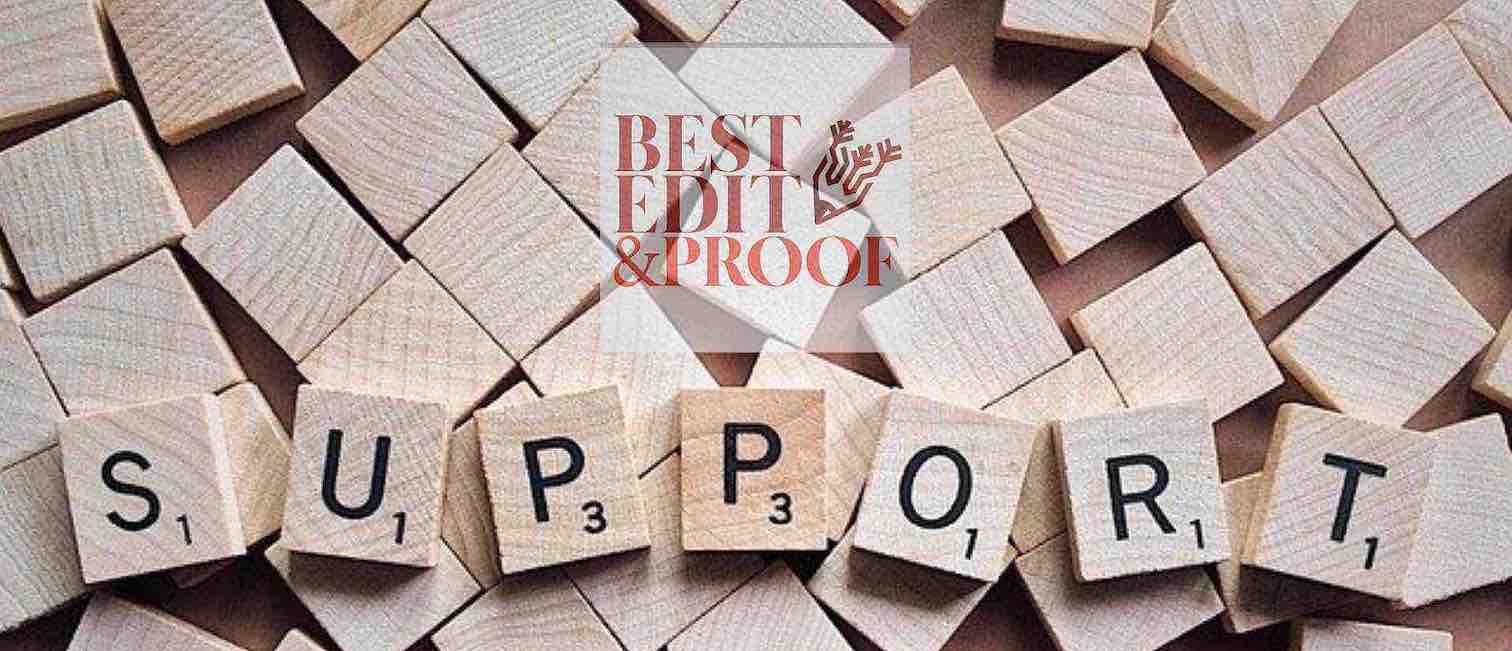Proofreading a dissertation differs from dissertation editing in the aspect that it does not drastically change the composition of the manuscript. The fundamental purpose of dissertation proofreading is to enhance a document's linguistic clarity and formatting. And as such, the amount of time required to proofread is lower than that needed to edit a dissertation. It is an integral part of the dissertation submission process that ensures a manuscript's overall veracity. But, owing to its low turnaround time and seemingly lackluster objective, many academics do not prioritize proofreading adequately.

Dissertation proofreading is an undertaking next in the hierarchy to the editing and revising stages. It is the final step in the writing process that primarily seeks to eliminate all grammatical, lexical, syntactical, and any other surface-level errors from a dissertation.
Proofreading a dissertation differs from dissertation editing in the aspect that it does not drastically change the composition of the manuscript. The fundamental purpose of dissertation proofreading is to enhance a document's linguistic clarity and formatting. And as such, the amount of time required to proofread is lower than that needed to edit a dissertation.
It is an integral part of the dissertation submission process that ensures a manuscript's overall veracity. But, owing to its low turnaround time and seemingly lackluster objective, many academics do not prioritize proofreading adequately.
They either schedule it right before the deadline as an obligatory gesture or simply skip over it. However, although an ancillary step, proofreading demands as much validation and expertise as the other stages in the writing process.
It necessitates an academic to be thorough with the conventions of the language used in the document and have an eye for detail. In other words, proofreading is a more demanding and crucial process than one considers it to be. Thus, for every academic looking to excel at writing worthy dissertations, mastering proofreading is one of the prerequisites.
Proofreading might come across as a straightforward process not requiring much preparation. However, if not executed in an organized manner, it can get convoluted quickly.
The following steps combat such scenarios by dividing proofreading into a series of comprehensible and easy-to-follow tasks.
Proofreading is not an immediate process. Ideally, it requires writers to forget the perspective(s) they formed during the writing stage and review their manuscripts in a new light. And this is only possible when writers insert an interval between the writing and the proofreading stages.
Thus, before starting to proofread a manuscript, writers should take a gap substantial enough to help them let go of any contextual biases. Once they are free from any preset stance(s), they can assess the mistakes in their manuscripts with increased clarity.
Also, the intervals typically range from mere hours to days and even weeks. Hence, writers should decide beforehand on the time they can afford to give the proofreading process instead of setting some aside at the last minute.
In the recent two decades, the dominance of screens over paper has altered several aspects of our lives. And proofreading is one of them.
Today, it is not uncommon to see academics prefer their computer screens to proofread their dissertations. However, there are also those that hail the supremacy of paper-based proofreading - using rulers, highlighters, pencils, and what not to scrutinize their manuscripts. Thus, writers should decide which proofreading approach —screen-based, paper-based, or a combination of both — to abide by.
This step also involves fixating on online writing tools to help with proofreading. The accuracy of these tools is contestable, but they significantly reduce the time and complexity of the proofreading process. However, while we promote the use of these tools, given their benefits, we ask you not to rely on them entirely. While these tools are exceptional and beyond, they are still programs powered by artificial intelligence and software set by strict rules. Therefore, it is always better to edit and proofread with these tools and then check your text manually or hire professional editing and proofreading services for a flawless result.
Every institution offers a dedicated set of formatting guidelines for dissertations. These typically include specifications of the paper used, the margins, the layout of the manuscript, length of the text, etc.
When proofreading, writers should first check whether their manuscripts duly abide by these guidelines. Also, this is the step where writers should review the citations as well - the references and the appropriate styles.
Proofreading is predominantly a lone endeavor. However, there are scenarios when even the most meticulous proofreaders overlook a few mistakes and inconsistencies in their texts due to their opinionated view(s).
In such cases, having a second set of eyes to offer feedback can be highly beneficial. A second opinion can unearth any hidden flaws in the text, point out any "comma" or spacing errors, rearrange a sentence for increased legibility, etc.
Dissertation proofreading is a strategic venture that entails governing various variables to achieve a targeted outcome. After all, even the most well-researched and put together dissertation can fall prey to reduced credibility if not proofread before submission. Thus, it is essential that academics review their manuscripts more than once after the writing phase. And while doing so, they follow the steps mentioned above (in the given order) to maximize their proofreading efforts.
Best Edit & Proof expert editors and proofreaders focus on offering manuscripts with proper tone, content, and style of academic writing, and also provide an upscale editing and proofreading service for you. If you consider our pieces of advice, you will witness a notable increase in the chance for your research manuscript to be accepted by the publishers. We work together as an academic writing style guide by bestowing subject-area editing and proofreading around several categorized writing styles. With the group of our expert editors, you will always find us all set to help you identify the tone and style that your manuscript needs to get a nod from the publishers.
You can also avail of our assistance if you are looking for editors who can format your manuscript, or just check on the particular styles for the formatting task as per the guidelines provided to you, e.g., APA, MLA, or Chicago/Turabian styles. Best Edit & Proof editors and proofreaders provide all sorts of academic writing help, including editing and proofreading services, using our user-friendly website, and a streamlined ordering process.
Visit our order page if you want our subject-area editors or language experts to work on your manuscript to improve its tone and style and give it a perfect academic tone and style through proper editing and proofreading. The process of submitting a paper is very easy and quick. Click here to find out how it works.
Our pricing is based on the type of service you avail of here, be it editing or proofreading. We charge on the basis of the word count of your manuscript that you submit for editing and proofreading and the turnaround time it takes to get it done. If you want to get an instant price quote for your project, copy and paste your document or enter your word count into our pricing calculator.
Contact us to get support with academic editing and proofreading. We have a 24/7 active live chat mode to offer you direct support along with qualified editors to refine and furbish your manuscript.

Follow us on Twitter, LinkedIn, Facebook, Instagram, and Medium.
For more posts, click here.
This article gives you 4 easy-to-follow steps to proofread a dissertation effectively. To give you an opportunity to practice proofreading, we have left a few spelling, punctuation, or grammatical errors in the text. See if you can spot them! If you spot the errors correctly, you will be entitled to a 10% discount.

The difference between proofreading and editing is a challenging issue to understand. This article provides a general overview of these two services and discusses what they involve. Knowing the difference is especially important when you intend to hire an editor to polish up your manuscript. Writing academic or research papers require specific knowledge of editing and proofreading. Obviously, you would always like to write error-free and easy-to-read content. Thus, you should concentrate on eliminating grammar mistakes, punctuation errors, sentence construction issues, and many more.
Continue Reading
Although most editing and proofreading are performed today using the ‘Track Changes’ feature of Microsoft Word or other commenting tools, you may encounter traditional proofreading marks and symbols on a hardcopy document. In desktop publishing, it is important to understand the meaning of proofreaders’ marks. Both editors/proofreaders and clients, regardless of their backgrounds, should have the same standard marks for easy communication.
Continue Reading
In terms of academic achievement, editing is one of the most important requirements. Therefore, taking full advantage of this service will help your project reach its maximum potential and improve the quality of the paper. It also increases the chances that your article will be accepted for publication in academic peer-reviewed journals.
Continue Reading
For all people in the academic or literary industry, it is a well-known fact that no content is deemed complete without editing and proofreading. It is that much of an important part of the writing process and cannot be overlooked. Therefore, hiring professionals is a wise idea. However, if you are new to this, availing yourself of the right editing and proofreading services can be quite confusing. Here, we will discuss all the things you need to be careful about while availing of professional editing and proofreading services.
Continue Reading
Proofreading is the process of checking errors in your written content before posting or sharing it. It is the last step of writing and includes the correction of various spelling, punctuation, typos, and formatting mistakes, or inconsistencies. Whether your content is an academic paper, online article, print flyer, or job application, you need to proofread the content. As proofreading is a significant step in the entire writing process, you need to know the following 8 proofreading tips.
Continue Reading